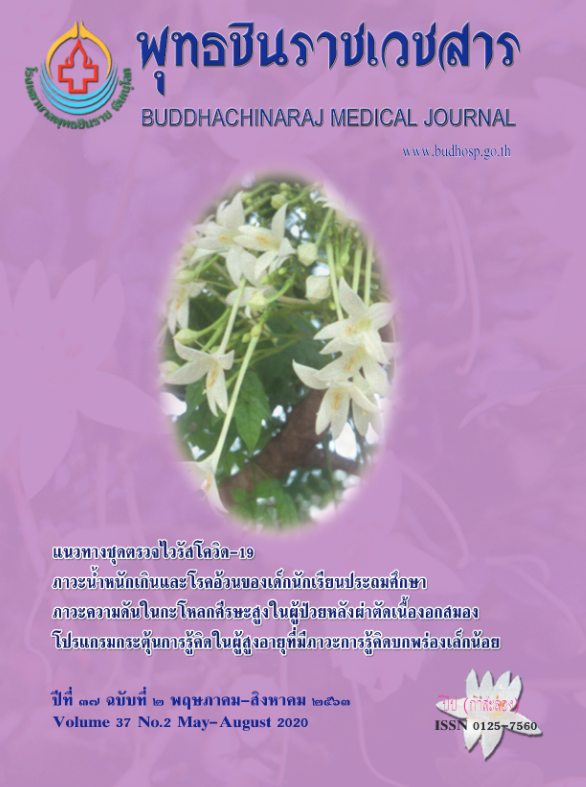ผลของโปรแกรมกระตุ้นการรู้คิดในผู้สูงอายุที่มีภาวะการรู้คิดบกพร่องเล็กน้อย
โปรแกรมการกระตุ้นการรู้คิดในผู้สูงอายุ
คำสำคัญ:
ผู้สูงอายุ, การกระตุ้นการรู้คิด, ภาวะการรู้คิดบกพร่องเล็กน้อยบทคัดย่อ
ผู้สูงอายุที่มีภาวะการรู้คิดบกพร่องเล็กน้อยหากได้ร้บการคัดกรองและกระตุ้นด้วยกิจกรรมที่เหมาะสมจะช่วยชะลอความเสื่อมได้ การศึกษาครั้งนี้เป็นการวิจัยกึ่งทดลองแบบหนึ่งกลุ่ม วัดผลก่อนและหลัง มีวัตถุประสงค์เพื่อศึกษาผลของโปรแกรมกระตุ้นการรู้คิด ในผู้สูงอายุที่มีภาวะการรู้คิดบกพร่องเล็กน้อย ศึกษาในผู้สูงอายุทั้งชายและหญิงที่มีภาวะการรู้คิดบกพร่องเล็กน้อยในพื้นที่หมู่ 4, 5 และ 6 ตำบลอรัญญิก อำเภอเมือง จังหวัดพิษณุโลก ตามเกณฑ์คัดเข้าและคัดออกจำนวน 25 คน โดยให้เข้าร่วมโปรแกรมกระตุ้น การรู้คิดซึ่งผู้วิจัยได้ดัดแปลงมาดำเนินโปรแกรมฯ 2 ครั้งต่อสัปดาห์ เป็นเวลา 8 สัปดาห์ เครื่องมือที่ใช้ ได้แก่ แบบสอบถามข้อมูล ส่วนบุคคล, แบบทดสอบภาวะสมองเสื่อมระยะแรก (MoCA), คู่มือสำหรับผู้ร่วมวิจัย และโปรแกรมกระตุ้นการรู้คิดซึ่งผู้วิจัยได้ ดัดแปลงมา นำเสนอเป็นค่าความถี่ ค่าร้อยละ และค่ามัธยฐาน (Q1, Q3) เปรียบเทียบค่ามัธยฐานของคะแนนแบบทดสอบภาวะ สมองเสื่อมระยะแรกในผู้สูงอายุก่อนและหลังทดลองด้วยการทดสอบ Wilcoxon signed rank กำหนดระดับนัยสำคัญทางสถิติที่ 0.05 พบว่า ค่ามัธยฐานของคะแนนแบบทดสอบภาวะสมองเสื่อมระยะแรกของผู้สูงอายุที่เข้าร่วมวิจัยหลังเข้าร่วมโปรแกรมกระตุ้น การรู้คิดสูงกว่าก่อนเข้าร่วมโปรแกรมฯ อย่างมีนัยสำคัญทางสถิตินั่นคือ โปรแกรมกระตุ้นการรู้คิดสามารถเพิ่มสมรรถภาพทางสมอง ในผู้สูงอายุที่มีภาวะการรู้คิดบกพร่องเล็กน้อยและสามารถนำไปขยายผลในพื้นที่อื่นได้
เอกสารอ้างอิง
2. Ferri CP, Prince M, Brayne C, Brodaty H, Fratiglioni L, Ganguli M, et al. Global prevalence of dementia: A Delphi consensus study. Lancet J 2005;366(9503):2112-7.
3. Prasartkul P, editor. Situation of the Thai elderly 2016. Nakhon Pathom: Printery Co., Ltd; 2017.
4. Karuncharernpanit S. Older people with dementia and nursing care: A challenging role for nurses. NJPH [Internet]. 2015 [cited 2019 Jun 13];25(1):1-12. Available from:https://he02.tci-thaijo.org/index.php/tnaph/article/view/36148/29999
5. Roberts RO. Higher risk of progression to dementia in mild cognitive impairment cases who revert to normal. Neurology 2014;82(4):317-25.
6. Smith T, Gildeh N, Holmes C. The Montreal cognitive assessment: Validity and utility in a memory clinic setting. Can J Psychiat 2007;52(5):329-32.
7. Subindee S. Mild cognitive impairment in older persons with chronic illness attended at a chronic care clinic of a primary care unit, Khon Kaen province. J Nurs Sci Health 2014;37(1):43-50.
8. Jeeraya S, Hengudomsub P, Vatanasin D, Pratoomsri W. Effects of cognitive stimulation program on perceived memory self-efficacy among older adults with mild cognitive impairment. J Faculty Nurs Burapha Univ 2018;26(2):30-9.
9. Saddichha S, Pandey V. Alzheimer's and non-Alzheimer's dementia: A critical review of pharmacological and nonpharmacological strategies. Am J Alzheimers Dis 2008;23(2):150-61.
10. Aguirre E, Hoare Z, Streater A, Spector A, Woods B, Hoe J, et al. Cognitive stimulation therapy (CST) for people with dementia who benefits most?. Int J Geriatr Psychiatr 2013;28(3):284-90.
11. Santana-Sosa E, Barriopedro MI, Lopez- Mojares LM, Perez M, Lucia A. Exercise raining is beneficial for Alzheimer's patients. Int J Sports Med 2008;29(10):845-50.
12. Nakawiro D, Chansirikarn S, Srisuwan P, Aebthaisong O, Sudsakorn P, Vidhyachak C, et al. Group-based training of executive function, attention, memory and visuospatial function (Team-V) in patients with mild neurocognitive disorder. J psychiatr Assoc Thailand 2017;62(4):337-48.
13. Institute of Geriatric Medicine, Department of Medical Services, Ministry of Public Health. Cognitive stimulation in people with mild cognitive impairment. Bangkok:Institute of Geriatric Medicine, Departmentof Medical Services, Ministry of Public
Health; 2014.
14. Kelly ME, Loughrey D, Lawlor BA, Robertson IH, Walsh C, Brennan S. The impact of exercise on the cognitive functioning of healthy older adults: A systematic review and meta-analysis. Ageing Res Rev 2014;16:12-31.
15. Suwanmosi P, Kaspichayawattana J. The effect of cognitive stimulation program on memory of community-dwelling older persons with milld cognitive impairment. J Police Nurs 2016;8(2):45-57.






